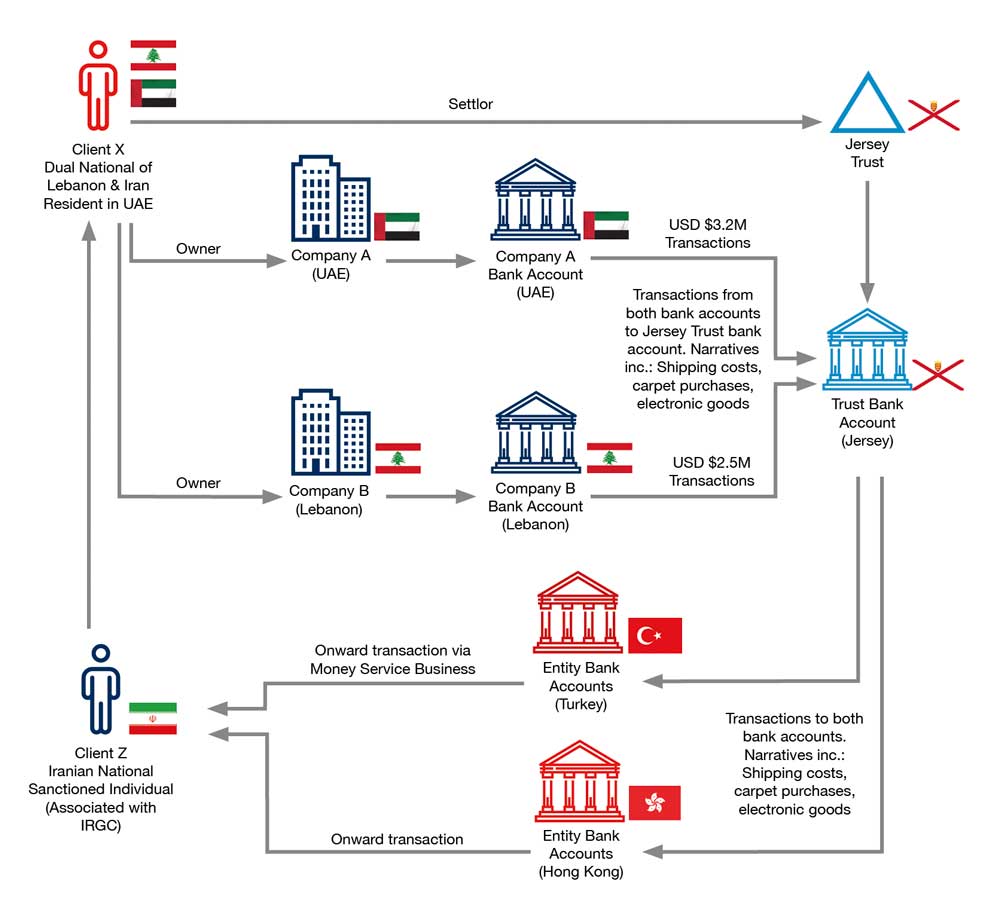Client X was born in Iran, a sanctioned high-risk country1, including for Terrorist Financing (TF) and Proliferation Financing (PF). Client X resides in another high-risk Middle Eastern jurisdiction linked to TF risks. Client X approached a Jersey Trust Company Service provider (TCSP) to set up a discretionary trust for succession planning purposes and requested personal bank accounts be held in various currencies for proposed overseas investments.
Client X had business interests in the Middle East and owned Company A in Lebanon and Company B in the United Arab Emirates (UAE). Both companies engaged in ‘general trading’2, focusing on the physical movement of goods, encompassing a wide range of activities, including importing, exporting, and re-exporting. This sector often involves direct engagement in logistics, managing transportation, warehousing, and customs clearance.
Trade can be complex with interconnected supply chains stretching around the world. These have been seen to be exploited by Organised Criminal Groups (OCGs), Professional Money Launderers (PMLs), and TF/PF networks.
Companies A and B sold expensive silk carpets and electronic and mechanical equipment.
The Jersey-regulated TCSP created a discretionary trust, and personal bank accounts were opened with a Jersey-regulated financial institution.
The bank account activity operated as expected for the first three months. Subsequently, a transaction monitoring alert identified that the account was not operating in-line with expectations. The bank identified that a total of USD 2.5 million had been transferred to Jersey from Company A’s bank account in Lebanon, and USD 3.2 million received from Company B in the UAE. Transaction references contained “shipping costs”, “carpet purchase”, and “electrical goods”. The bank identified that several wire transfers were made to entities in Türkiye and Hong Kong, with similar references, usually on the same day for the same amount.
Purchases were also made for high-value cars in the Middle East, including various payments to third-party individuals resident in both jurisdictions of interest.
Open-source research indicated client X was associated with a sanctioned individual, subject ‘Z,’ who was linked with the Iranian Islamic Revolutionary Guard Corps (IRGC)3 connected indirectly to an entity involved in the development and production of Weapons of Mass Destruction (WMDs) for the Iranians.

1 https://www.fatf-gafi.org/en/countries/detail/iran.html
3 https://www.bbc.co.uk/news/world-middle-east-47852262
PF refers to the provision of funds or resources to support the development, production, or acquisition of weapons of mass destruction (WMD), including nuclear, chemical, and biological weapons. This type of financing can occur through various means, such as legal or illegal financial transactions, support from state or non-state actors, and the exploitation of financial systems to disguise the true purpose of the funds.
Proliferation financing poses significant threats to global security, as it enables states or organisations to advance their capacities to develop harmful weaponry that can be used for aggression against other nations or in terrorist activities. To combat this threat, many countries and international organizations implement strict regulations and monitoring systems designed to prevent and disrupt the flow of funds intended for proliferation purposes. This includes measures such as enhanced due diligence by financial institutions and stricter compliance with anti-money laundering (AML) and counter-terrorism financing (CTF) policies.
We continually strive to enhance the quality of the products we produce, from our typologies to reports, Insight papers to training guides. However, we can only improve if you share your feedback with us about what you think about them. This is your chance to let us know and we appreciate it your feedback. Click the navy button below or scan the QR code.
Tell us what you think >.svg)